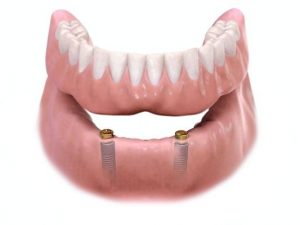
Implant retained dentures use dental implants to secure dentures in your jawbone, offering more stability and function compared to traditional dentures. This article outlines their main benefits and explains what sets them apart from regular dentures.
Key Takeaways
- Implant retained dentures provide enhanced stability and comfort as they are anchored in the jawbone, unlike traditional dentures that rest on the gums.
- Candidates for implant retained dentures must have sufficient jawbone density and be in good health, with the procedure potentially requiring preparatory surgeries for optimal implant placement.
- Effective maintenance and regular dental check-ups are essential for the longevity of implant retained dentures, ensuring their proper function and health.
Understanding Implant Retained Dentures
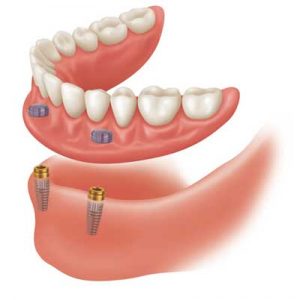
What sets implant retained dentures apart from traditional options are:
- Stability and comfort
- Being held in place by dental implants inserted into the jawbone, unlike traditional dentures that rest on the gums
- Allowing for normal chewing and speaking without the fear of them coming loose, enhancing overall comfort and functionality
- Easier transition for patients compared to traditional dentures, as they require less adjustment time
Implant retained dentures offer several benefits:
- They look like natural teeth, providing significant aesthetic benefits.
- They improve speech and chewing ability.
- They offer more comfort for patients.
- They help restore oral health by replacing missing teeth.
- They prevent bone loss.
Many most patients prefer implant retained dentures because they look and function like natural teeth, requiring fewer implants.
Types of Implant Retained Dentures
There are two primary types of implant retained dentures. These include bar retained and ball retained options. Each type comes with its unique advantages, tailored to meet different patient needs.
Bar retained dentures use a thin metal bar fixed in the jawbone, enabling removable dentures to securely clip onto it. This option offers enhanced stability compared to traditional dentures and is secured by connecting to two to five implants.
On the other hand, ball retained dentures utilize ball-shaped connectors on the multiple implants, where metal attachments on the implants fit into sockets on the denture. These ball retained overdentures can effectively replace only a few missing teeth while maintaining a higher level of functionality.
Who Should Consider Implant Retained Dentures?
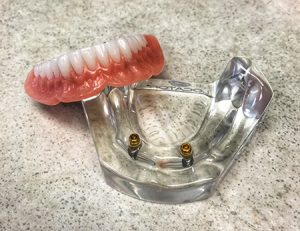
Moreover, overall health plays a significant role. Ideal candidates for these dentures are individuals who:
- Are in good general health, as chronic conditions might require additional treatments before receiving implants
- Have lost most or all of their teeth
- Meet the necessary health and jawbone density criteria
In some cases, pre-prosthetic surgery may be required to prepare the mouth for implants. This could involve extracting decayed or damaged teeth or performing bone grafting to ensure there is enough bone to support the dental implant surgery. An implant specialist can help determine the best course of action.
Benefits of Implant Retained Dentures
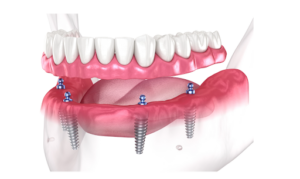
- Help prevent bone loss in the jaw, a common issue that occurs after tooth loss.
- Preserve facial structure.
- Prevent further deterioration by maintaining bone density.
Another notable benefit is the ability to enjoy a wider variety of foods without the dietary restrictions commonly associated with traditional dentures. Implant retained dentures provide:
- Better retention, which helps prevent embarrassing situations like dentures slipping during meals or conversations.
- Stability that allows patients to chew solid foods confidently.
- An enhanced overall diet and nutrition.
Patients with implant-supported dentures offer often report increased confidence during social interactions. The natural look and secure fit of these dentures transform the experience, making it more like having natural teeth. This boost in confidence can significantly improve one’s quality of life.
The Procedure for Implant Retained Dentures
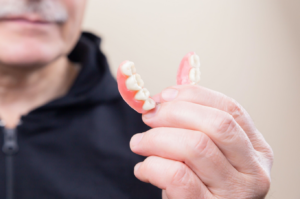
The first step in the procedure is the surgical placement of the implants into the jawbone at strategic locations to support the dentures. The process includes:
- The duration of the surgical procedure may vary based on the number of implants being placed and can take several hours to complete.
- Following the surgery, a healing period of up to six months is necessary for osseointegration, during which the implants fuse with the jawbone.
- Patients receive a healing denture during this time, which does not attach to the implants but supports the healing process. Additionally, dental implant placement is crucial for the success of the overall procedure.
The process of fitting dentures after implant placement involves the following steps:
- The gums usually require up to two weeks to heal following implant placement.
- Once the healing period is complete, the abutments are placed onto the implants.
- The new dentures are then attached subsequently.
- After this healing period, artificial teeth can be attached.
This step-by-step process ensures that the dentures are securely and comfortably fitted.
Recovery and Aftercare
Recovery time after implant retained denture surgery can vary, but most individuals can generally return to normal activities within two to three days. However, full healing can take anywhere from three to six months. During this period, patients should avoid intense physical activity for at least 48 hours post-surgery to minimize discomfort.
Proper aftercare is crucial for a smooth recovery. Patients are advised to follow a soft food diet, including items like smoothies, creamy soups, and yogurts, to support healing. Using a healing denture during this period helps protect the surgical sites and supports the overall recovery process. Additionally, it’s important to avoid hard chew foods that could disrupt healing.
Comparing Implant Retained Dentures to Traditional Dentures
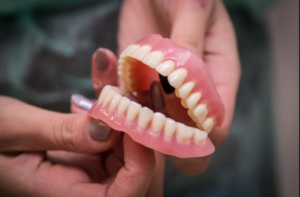
- Implant retained dentures offer enhanced stability.
- They provide improved security during eating and speaking.
- Traditional dentures often require frequent adjustments to maintain a secure fit.
- Implant-retained options typically do not require frequent adjustments.
Traditional dentures rely on suction or adhesive, which can sometimes fail, leading to embarrassing slips for traditional denture wearers. In contrast, fixed dentures, specifically fixed implant supported dentures, are securely anchored to the jawbone, eliminating this issue and providing a higher level of comfort. For individuals seeking a long-term solution, implant-retained dentures offer improved comfort and overall satisfaction. Conventional dentures may not provide the same level of stability as these options. An implant supported denture option is also available for those who prefer it, including removable implant dentures and permanently fixed options.
Moreover, traditional dentures can result in a significant loss of chewing capacity, as they are only supported by the gum tissue and jawbone. Implant retained dentures, on the other hand, restore a natural bite and allow patients to chew solid foods confidently, enhancing their diet and nutrition. This leads to higher patient satisfaction and a transformed denture experience.
Cost Considerations
Cost is an important factor to consider when deciding on implant retained dentures. The price ranges are:
- Individual implant posts: $1,500 to $3,200 each, depending on type and quality
- High-quality dentures: up to $5,000
- Lower-end denture options: around $1,300
In addition to the cost of the implants and dentures, factors that can add to the total cost include:
- Preparatory procedures such as bone grafts, which can add $200 to $1,000
- Dentists with advanced qualifications or specialization in implant-supported dentures, who generally charge more
- Geographical location, which can significantly impact the cost
When considering financial aspects, it’s crucial to explore payment plans and insurance options. These can help make the investment in cost effective implant retained dentures a more affordable option and manageable over time.
Maintaining Your Implant Retained Dentures

- Removing the dentures
- Using a soft-bristle toothbrush or denture brush for thorough cleaning
- Brushing at least twice a day to help prevent plaque build-up and keep the dentures in good condition.
It’s advisable to rinse the dentures after meals to eliminate food particles and reduce the risk of plaque accumulation. Additionally, soaking the dentures overnight in a cleaning solution can help maintain their condition, but it’s important to confirm the recommended soaking solutions with a dentist.
Regular dental check-ups are crucial for maintaining the health of both the dentures and the implants. During appointments, the dentist checks the fit of the dentures and addresses any issues. Keeping dentures moist when not in use prevents them from drying out and becoming damaged with proper care.
Choosing the Right Dental Professional
Selecting a qualified dental professional is a critical step in the journey to getting implant retained dentures. It’s important to check a dentist’s credentials and their membership in professional organizations related to dental care. This ensures that the dentist has the necessary training and expertise to perform the procedure effectively.
Patient reviews can provide valuable insight into a dentist’s reputation and the quality of care they offer. Effective communication and a good rapport with your dentist can enhance the treatment experience, making it more comfortable and reassuring.
Consulting multiple dentists helps compare treatment options and find the most effective solution for your needs.
Summary
In summary, implant retained dentures offer a revolutionary solution for those struggling with traditional dentures. They provide improved stability, comfort, and aesthetic benefits, closely mimicking natural teeth. The procedure, while involving multiple steps, results in a secure and long-lasting dental solution.
Choosing implant retained dentures can significantly enhance your quality of life, offering the freedom to eat, speak, and smile with confidence. By understanding the benefits, procedure, and maintenance involved, you can make an informed decision and take the first step towards a better dental experience.
Frequently Asked Questions
What are implant retained dentures?
Implant retained dentures are custom-made prosthetics that offer stability and a natural appearance through secure attachment to dental implants. They serve as an effective solution for individuals with missing teeth.
Who is an ideal candidate for implant retained dentures?
An ideal candidate for implant retained dentures is someone who has lost most or all of their teeth, possesses adequate jawbone density to support the implants, and maintains good general health. These factors are essential for ensuring successful implantation and functionality.
What is the recovery time for implant retained dentures?
Recovery time for implant retained dentures typically allows individuals to return to normal activities within two to three days, while complete healing may take up to six months.
How do implant retained dentures compare to traditional dentures?
Implant retained dentures provide greater stability, comfort, and functionality than traditional dentures, which frequently necessitate adjustments and may shift. Therefore, they are often a more reliable choice for denture wearers.
How much do implant retained dentures cost?
The cost of implant retained dentures typically ranges from $1,500 to $3,200 per implant post, with high-quality dentures potentially costing up to $5,000. It is essential to consider both the type and quality of the materials used when estimating the total expense.
